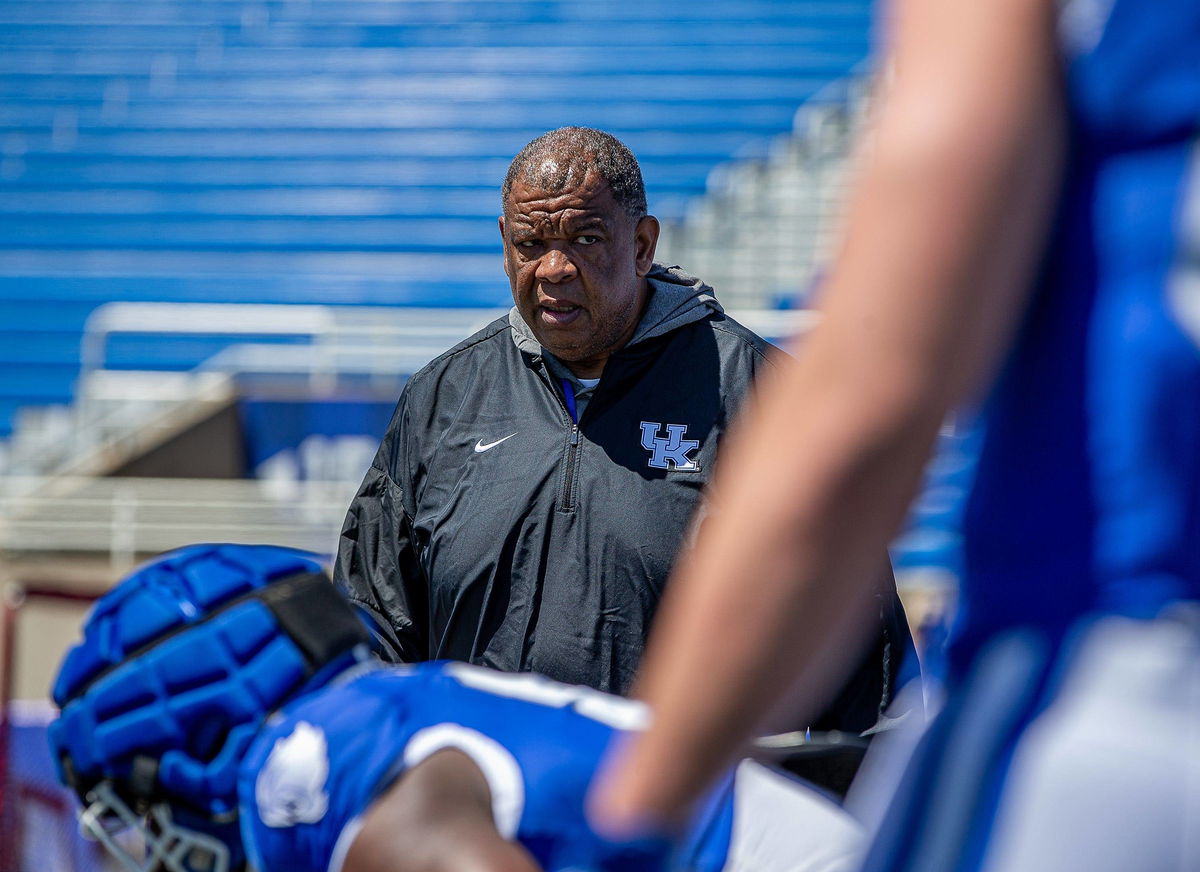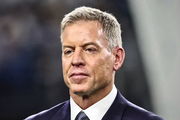
Imago
Syndication: The Courier-Journal Kentucky associate head coach/tight end coach Vince Marrow worked his squad through drills during the Kentucky Wildcats Blue White scrimmage at Kroger Field on Saturday afternoon in Lexington, Kentucky. April 13, 2024 Louisville , EDITORIAL USE ONLY PUBLICATIONxINxGERxSUIxAUTxONLY Copyright: xJeffxFaughender/CourierxJournalx USATSI_23015936

Imago
Syndication: The Courier-Journal Kentucky associate head coach/tight end coach Vince Marrow worked his squad through drills during the Kentucky Wildcats Blue White scrimmage at Kroger Field on Saturday afternoon in Lexington, Kentucky. April 13, 2024 Louisville , EDITORIAL USE ONLY PUBLICATIONxINxGERxSUIxAUTxONLY Copyright: xJeffxFaughender/CourierxJournalx USATSI_23015936
Vince Marrow’s decision to leave Kentucky for Louisville shook the college football landscape, and what’s behind his departure is as much about timing and relationships as it is about football. The Wildcats acted quickly in promoting Derek Shay to tight ends coach, but everyone within the program knew it wouldn’t be simple to replace Marrow’s combination of recruiting expertise, on-field coaching, and front-office leadership. Recent accounts have pulled back the veil on what transpired. Marrow and Kentucky coach Mark Stoops came from a lifelong friendship based on their Youngstown, Ohio upbringings, but even the best relationships wear thin when communication breaks down.
Watch What’s Trending Now!
Marrow only recently spoke out about a “communication breakdown” between himself and Stoops, likening it to a marriage in which little misunderstandings accumulate until things just don’t feel right anymore. The silence resulted in an awkward, public breakup—one that even took Stoops by surprise when ESPN reported it before he heard it himself directly from Marrow. But Marrow isn’t bitter looking back. He’s eager for his new position as Louisville’s Executive Director of Player Personnel and Recruiting, where he’s already discussing remaking the roster and making the Cardinals a national title contender.
Recently, there were rumors that the veteran Kentucky football coach quit Lexington because he did not enjoy the city or lost influence in the program. In a recent online discussion with Aaron Torres on the 16th of June, Marrow cleared off the rumor tagged on him. “People in Lex got to be like, man, either this dude will fall on his head, or somebody’s lying because they know I love Lexington. I’d had major schools come after me, and I didn’t leave. I usually tell people I’m going to retire. I’m going to keep a house still in Lexington because I love the area, no,” Marrow says.
ADVERTISEMENT
Recruiting became a quest for Marrow—not only for the program but for the fans who’d endured decades of derision. He remembers how visiting schools would show recruits old pictures of almost barren Kentucky stadiums, sneering, “You want to play there?” But Marrow and the staff reversed the image, getting top high school players from Ohio and far beyond, and gradually assembling a team that could hold its own in the SEC. The turning point arrived in the form of huge victories over South Carolina, Missouri, and Mississippi State, and even snapping a decades-long losing tradition against Florida. The Citrus Bowl upset of Penn State was particularly poignant to Marrow, who witnessed thousands of Kentucky fans rejoicing in a team no longer considered a joke.
So why depart now? Marrow had ample chances in the past, including top program offers, but remained faithful to Kentucky. The new relocation to Louisville, he maintains, is about embracing a new challenge and a new era of college football. The sport is evolving, with the transfer portal and the necessity of a more NFL-style front office model. He is thrilled to be working with Jeff Brohm, a friend of many years, and to assist in developing something special at Louisville. Marrow admits, “Everybody who lives in Lexington knows I love that place of course. That’s probably one of the top three cities I have lived in, and I played pro ball in a lot of places. That place is very special to me; there are really good people, great friends.”
Marrow frequently comments on how friendly and understanding the locals are, from attending a football game to grabbing a bite at a local diner to simply strolling down Main Street. Concerning the rumors that he departed because he did not like Lexington or lost influence, Marrow clears things up. He just signed an extension on his contract and was among the highest-compensated assistants at Kentucky. “They don’t offer contract extensions to nobodies,” he says. The notion that he was forced out or dissatisfied with the city can’t be true. But Marrow isn’t dwelling on the past resentfully. He’s enthusiastic about his new position as Louisville’s Executive Director of Player Personnel and Recruiting, where he’s already discussing rebuilding the roster and making the Cardinals a national title threat.
ADVERTISEMENT
Vince Marrow looks forward to a new era of Louisville football
Vince Marrow’s relocation from Kentucky to Louisville is more than a zip code change—it’s a statement of aspiration, and he’s not shy about being excited about the task at hand. “I think Jeff Brohm is one of the top 10 coaches in college football,” says Marrow. It’s Marrow’s confidence in Louisville’s possibilities that stems from his longstanding friendship with head coach Jeff Brohm, dating back 25 years. He paints Brohm not as merely a boss, but as a trusted friend, a man who knows what it takes to succeed at the highest level.
ADVERTISEMENT
Marrow says, “When we knocked them out that first year, when it was his first year they were nine and three. If they win that game, they’re probably in the playoffs. Last year, they lost to a bad Stanford team, and they went eight and four, nine and four, so they’re right there.” In Jeff Brohm’s inaugural year at Louisville, the Cardinals finished 10-4, their first double-digit win season in 10 years, and earned a trip to the ACC Championship Game. Louisville began the season hot, at 10-1, and ranked as high as No. 9 in the AP Poll.
But then came the late-season meltdown everyone remembers. Losses to Kentucky, Florida State in the ACC Championship, and USC in the Holiday Bowl. Marrow’s quip about “beating a bad Stanford team” was perhaps an exaggeration for dramatic effect. But it’s a tip of the hat to how one poor loss—a loss to an underdog, perhaps—can spoil a promising season. Marrow confesses, “I don’t even want to say we’re going to build an SEC roster. We’re going to build an NFL roster.” Building an “NFL roster” involves highlighting players who aren’t merely good enough to survive in the hardest college conference—they’re pro-built.
Top Stories
Sean McDermott Announces Bad News for Josh Allen as Bills QB Rings Alarm Bells

NASCAR Rumor: Fans Left Baffled as Insider Leaks ‘New Championship Format’ Weeks Before 2026 Season

PGA Tour Makes Feelings Clear as $14 Billion Sponsor Cuts All Ties After 17 Years

MLB Refuses to Come to Blue Jays Star’s Aid as Ross Atkins Refuses to Budge Amid Disagreement

Troy Aikman Makes Decision on NFL Job as Cowboys Legend Announces Stance on ESPN Exit

Livid Fans Accuse NASCAR of Greedy Tactics Over Iconic Race’s Ticket Price

That is to say, yes, targeting recruits with pro-level ability, but it also involves assembling a coaching and support staff capable of building that ability year in and year out. The transfer portal and NIL make it not enough to merely recruit well—you have to build, hold on to, and ready up players to go to the NFL. Marrow’s vision is to build Louisville as a destination where elite athletes not only come to play but also develop into future professionals.
ADVERTISEMENT
ADVERTISEMENT
ADVERTISEMENT
ADVERTISEMENT

